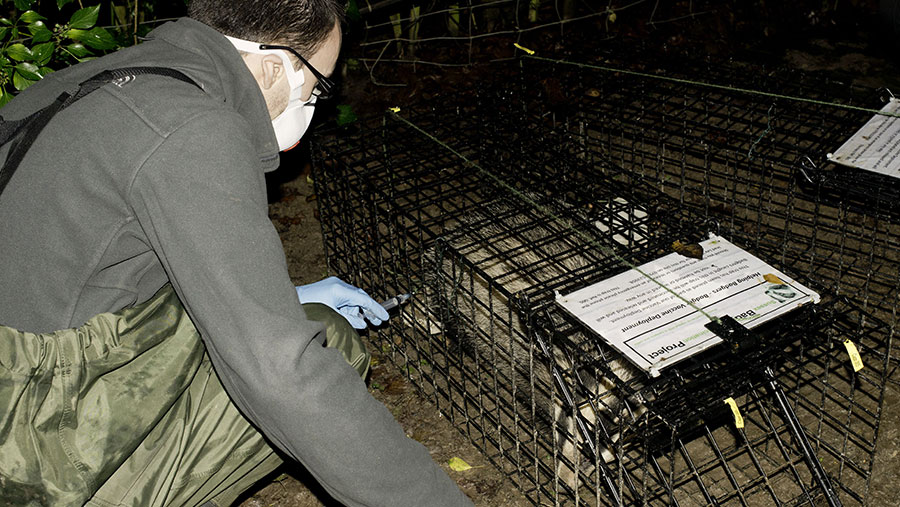Farm volunteers vaccinate 41 badgers against TB
 © FLPA/Hugh Clark/Rex Shutterstock
© FLPA/Hugh Clark/Rex Shutterstock A voluntary badger vaccination programme on Shropshire farms saw 41 badgers vaccinated against TB this summer.
Specially trained and licensed volunteers from the Shropshire Badger Group said 41 badgers were trapped and vaccinated with the Bacillus Calmette-Guérin (BCG) vaccine.
Group leader Jim Ashley explained the work involved volunteers braving steep hillsides, unsociable hours, and weather ranging from blistering sunshine to torrential downpours.
See also: Sussex badger vaccination project ‘progressing well’
The project began in late 2014, with only a handful of badgers vaccinated.
Mr Ashley described this, the first full year of badger vaccination, as a “resounding success”.
He said the four-year, rolling project cost about £5,000 to set up.
The main costs incurred includes £500 each to train six vaccinators, the construction of the group’s own cages to trap badgers and two fridges (about £300 each) to store the BCG vaccine.
Afterwards, the costs are “minimal”, Mr Ashley noted.
The vaccine costs £20 a dose and the volunteers give up their time to jab the badgers.
The farmer does not have to pay to have badgers vaccinated on his land. But he must allow access to vaccinators at specific times.
“We had a very good rapport with all the farmers concerned. They have been very open-minded”
Jim Ashley, Shropshire Badger Group
No money is provided by government to the scheme, which relies on donations from the community.
Although no official local badger population estimates have been carried out in the area, Mr Ashley said he was confident that more than 70% of badgers had been trapped and vaccinated over the eight farms – the figure scientists say is needed to boost badger TB immunity in populations.
“We had a very good rapport with all the farmers concerned. They have been very open-minded,” said Mr Ashley.
“It has been a pleasure to work alongside them.”
Hall Farm, Hanwood, Shropshire
Shropshire dairy farmer Andrew Bebb farms a 150-head dairy herd at Hall Farm, in Hanwood, near Shrewsbury, in Shropshire.
Mr Bebb was one of the eight farmers who allowed one volunteer to vaccinate badgers on his land over the summer.
Over two 48-hour windows, a total of seven badgers were vaccinated.
He said: “We have only got two badger setts on this farm, but one is fairly active.
“I found a dead badger on my farm in 2007, which I incinerated. A few weeks later, we had a TB test and we had a reactor.
“I found a dead badger on my farm in 2007, which I incinerated. A few weeks later, we had a TB test and we had a reactor”
Andrew Bebb, dairy farmer
“That happened for three years until we went TB-free in 2010. I have put physical barriers up to stop badgers entering the silage pit. You can do something about keeping the badgers and livestock apart in the winter, but not during the summer.
“Badger vaccination is a learning curve, but the group appears to have done better than last year when only a handful of badgers were vaccinated.”
NFU support
Robert Newbery, NFU West Midlands regional director, said there was no evidence to suggest vaccinating a proportion of the badger population can result in a reduction of TB rates in cattle.
He said: “Bovine TB is endemic in Shropshire and is one of the largest threats currently facing our beef and dairy farmers.
“This disease has a devastating impact on farming families and their businesses, on cattle forced into testing regimes every 60 days, and on badgers that also carry bovine TB.
“We support government policy and every possible measure, including strict testing and movement controls, biosecurity and management of the disease in wildlife have to be seen as the way to get on top of it.
“Bovine TB is a major problem and this should not be about blaming badgers or farmers; the disease is the villain and this is what needs to be dealt with plain and simple”
Robert Newbery, NFU
“The NFU is also supportive of the use of vaccines because they have a role to play in the long-term control of the disease, however, it will not cure a badger that is already infected, so simply its effectiveness, without other measures, will be limited.
“There is still no evidence which shows that vaccinating a proportion of the badger population actually results in a reduced risk to cattle.”
Mr Newbery praised the eight farmers and landowners who had opened their businesses to wildlife groups to carry out badger vaccination.
He said it showed that farmers take animal welfare and their duty of care to the farmed environment “very seriously”.
“We also support vaccination at the edge area of the disease to prevent TB being seeded into wildlife,” he added.
“Bovine TB is a major problem and this should not be about blaming badgers or farmers; the disease is the villain and this is what needs to be dealt with plain and simple.”
